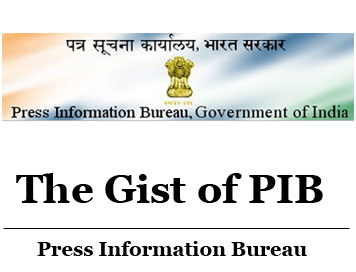(THE GIST OF PIB) Air Quality Index

(THE GIST OF PIB) Air Quality Index
(April-2023)
Air Quality Index
- As per Air Quality Index (AQI) data of the Central Pollution Control Board (CPCB), Delhi has witnessed maximum number of days with ‘Good to Moderate’ Air Quality during the first four months’ period of 2023 (i.e. January to April), as compared to the corresponding period of last 07 years since 2016 (barring the periods of very low anthropogenic, industrial and commercial activities during the Covid-19 lockdown year 2020).
About Air Quality Index
- AQI is a number, which is a measure of air quality. The higher the AQI, the worse the air.
- The colour-coded AQI index was launched in India in 2014, and it helps the public and the government understand the condition of the air and what subsequent measures are to be taken to combat the situation, based on its severity.
- There are six categories of AQI, namely ‘Good’ (0-50), ‘Satisfactory’ (51-100), ‘Moderately polluted’ (101-200), ‘Poor’ (201-300), ‘Very Poor’ (301-400), and ‘Severe’ (401-500).
- The pollutants measured include PM 10, PM 2.5, Nitrogen Dioxide, Ozone, Carbon, etc.
What is the impact of these pollutants?
- Among the more harmful pollutants are those of a smaller size, such as particulate matter (PM) 2.5, which is an atmospheric particulate matter of diameter smaller than 2.5 micrometres.
- It causes respiratory problems and reduces visibility. The particles can only be detected with the help of an electron microscope because they are so small.
- Due to their size, the PM 2.5 particles can easily bypass the nose and throat and can easily enter the circulatory system. The particles can also lead to chronic diseases such as asthma, heart attack, bronchitis and other respiratory problems.
CLICK HERE TO DOWNLOAD FULL PDF
CLICK HERE TO DOWNLOAD UPSC E-BOOKS
Study Material for UPSC General Studies Pre Cum Mains
Get The Gist 1 Year Subscription Online
Click Here to Download More Free Sample Material
<<Go Back To Main Page
Courtesy: PIB


